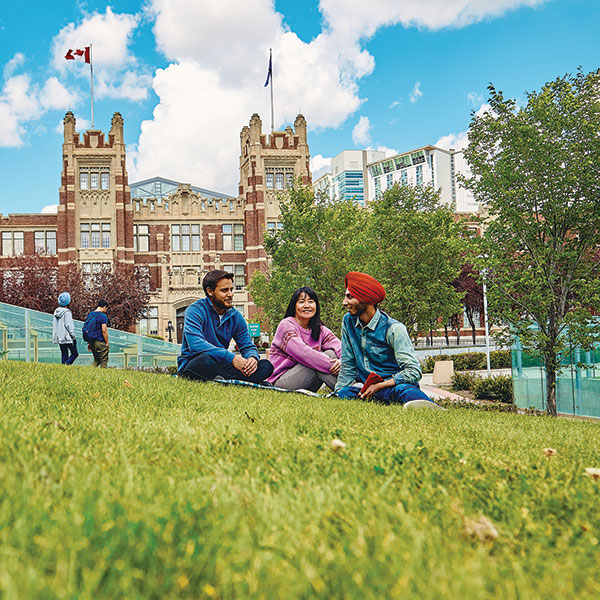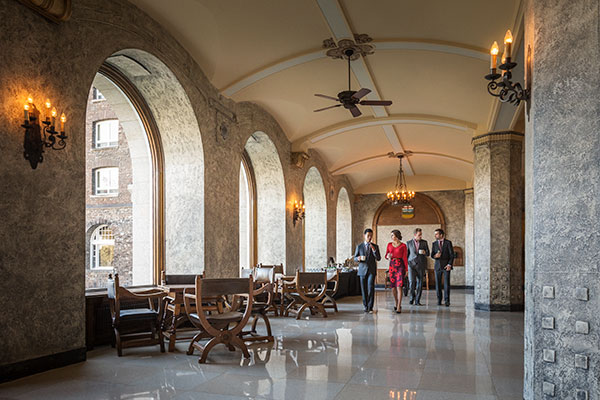On this page:
Overview
Are you looking to embark on a career in the vibrant world of travel and tourism? Our Hospitality and Tourism Management program, specializing in Travel and Tourism, is tailored to provide you with the necessary skills and knowledge to thrive in this exciting industry.
This program will give you insights into travel products and help you understand the travel and tourism ecosystem. It equips you to design memorable travel experiences and prepares you for travel jobs, destination planning, and travel consultancy.
Our program offers small classes covering various aspects of the global travel environment. Throughout the program, you'll:
- learn how to manage travel inventories proficiently and estimate costs
- delve into the financial intricacies of the travel industry and apply accounting concepts to real-world business challenges
- master guest experience by prioritizing guest satisfaction, understanding needs, and providing solutions
- learn impactful sales strategies and marketing techniques tailored for the travel sector
- develop effective and respectful communication skills for diverse groups
- learn to embrace leadership roles and instill a sustainable, ethically driven corporate culture
- implement economic theories and data-driven insights
- leverage technology to heighten productivity
- gain an understanding of how policy, planning, and execution can achieve operational success.
Our program ensures you stay updated with industry trends and technologies, ensuring relevance in an evolving market.
It also includes hands-on experience through collaborations with our on-campus Travel Centre industry partners.
As a graduate, you'll emerge as a well-rounded professional in the hospitality sector, with potential roles such as travel agent or counsellor, tourism jobs such as sales and marketing coordinator, working with a destination marketing organization, airline sales and reservations, and many other customer-service roles.
The Hospitality and Tourism Management Travel and Tourism specialization sets the foundation for your success in the dynamic world of travel and tourism. Whether you see yourself as a travel consultant, event planner, or an entrepreneur in the world of hospitality, it will prepare you for a rewarding career in this industry.
Those in the travel and tourism industry tend to be social, methodical and innovative.
You need:
- a good memory
- patience and a pleasant manner to deal with all types of people
- attention to detail
- well-developed sales skills
- typing and computer skills
- organization skills
- a working knowledge of global geography
- the ability to serve customers quickly and efficiently
- the ability to handle stressful situations calmly and effectively.
You should enjoy working with people, performing detailed work, and working on a computer. You should also have a love of travel and promoting travel experiences.
Graduates of this program may continue their education in the SAIT Bachelor of Hospitality and Tourism Management program and earn their degree with a further two years of study.
Between your first and second year, you'll complete an internship where you'll complete 400 hours of industry work.
The choice of worksite is flexible and can include hotels, restaurants, tour operators, car rental agencies, resorts, and other approved hospitality and tourism operations.
You'll also work in Destinations, SAIT's student-run travel agency throughout the program.
The Travel and Tourism specialization is well aligned with the Association of Canadian Travel Agencies (ACTA) endorsement standards to allow you to pursue the Certified Travel Counselor (CTC) accreditation once you graduate.
You'll also acquire key industry certifications in Workplace Hazardous Materials Information System (WHMIS), food safety, ProServe, and hospitality and tourism awareness. All these certifications must be completed in your first semester.
After successfully completing this program, you'll receive a SAIT Hospitality and Tourism Management diploma with a specialization in Travel and Tourism.
Careers and opportunities
Each year, SAIT conducts a survey between February and April to determine the employment rate, salary and satisfaction of our newest SAIT alumni.
![]() 95% graduate employment rate
95% graduate employment rate
![]() $36,400 average starting salary
$36,400 average starting salary
Find out more about our graduate employment statistics >
Our graduates may work in the following occupations. Some careers require additional experience and education.
Associated National Occupational Classification (NOC) codes: 60030, 60031, 62022, 64310, 64314, 64320, 65210.

Career planning support
Unsure which career path is for you? Here are some recommended career planning resources to help you decide your future.
You can also head to Alberta alis for lots of information about careers in Alberta, including quizzes and labour market information to help you narrow down a path.
Finally, you can take our online career finder quiz, which can help narrow your options based on your current skills and interests.
Courses
The Hospitality and Tourism Management - Travel and Tourism diploma requires 63 credits (22 courses) to complete.
The program spans two years, with two semesters in year one and two semesters in year two.
You must take all of the following courses to complete this program.
Hospitality core
| Course | Credits |
|---|---|
|
This course provides an introduction to financial accounting aspects of the hospitality industry. This includes generally accepted accounting principles, financial statement preparation, the accounting cycle, specialized journals, accounting for cash, accounts receivable, sales, payroll and inventories. |
3 |
|
Upon completion of this course, students will have acquired the knowledge and skills to use industry standard tools to perform financial calculations. The financial calculations include simple and compound interest, debt repayment, valuation of investments, simple and general annuities, amortization of debts, sinking funds and bond valuation problems. Students will also learn to analyze, apply, visualize and present the results to inform business planning and decision making related to the hospitality and tourism industry. |
3 |
|
This course examines techniques to communicate and present your ideas using your professional skills as well as a variety of technological solutions. Topics include writing business documents, creating and delivering presentations, preparation for career launch, foundations of effective teamwork, report writing, sourcing and citing information, and interpersonal communication. Concepts are reinforced through relevant, task-based activities and assessments. Equivalents:
|
3 |
|
In this introductory course in Microeconomics, you will learn about economic principles involved in analyzing problems in the business and consumer sectors of the Canadian economy. Some of the topics covered are: economic scarcity, demand, supply, elasticity, and perfect and imperfect competition. Equivalents:
|
3 |
|
This course explores financial strategies and techniques for analyzing business performance and decision-making in the hospitality industry. Topics include budget flexibility, contribution margins, and the strengths and weaknesses of master-budgeting models. Core skills taught in this course include analyzing budget variance, using cost/volume/profit (CVP) relationships to calculate break-even and contribution margins, conducting "what if" analysis and applying hospitality industry cost items, concepts and classifications. These skills will help you become a proactive decision-maker who understands complex financial matters in the hospitality industry. Pre-requisites:
|
3 |
|
This course explores the various sectors of the hospitality and tourism industry, the links between the sectors, and the benefits and impact of the industry on the economy, the environment and employment. Topics include hospitality and tourism careers, health and wellness in the industry, and the hospitality mindset. With consideration to customer satisfaction and pride of place, you will identify areas fundamental to the successful planning and development of a destination. |
3 |
|
This course will prepare you for applied learning environments and the workplace with appropriate certifications. Certifications include Food and Safety Sanitation (FSAN), ProServe liquor service training, Workplace Hazardous Materials Information System (WHMIS) training and White Hat Academy training for employees in Calgary's tourism industry. You will complete these certifications as part the course. |
1.5 |
|
This course provides an overview of Canadian and international laws applicable to the hospitality and tourism industry that will explain your legal and ethical responsibilities in a guest environment. Topics include travellers' rights in Canada and abroad, the basics of Canadian law, contract law, employment law and the legal structure of business, as well as liability and dispute resolution. To help with decision making, you will explore risk assessment tools and the practicalities of negligence for both personal injury and food and beverage service. |
3 |
|
Human Resource (HR) Management includes the foundational knowledge and skills required by HR Professionals and business managers. This course includes an overview of the field of human resource management, along with human resource planning, employee compensation and benefits, recruitment, selection and training of employees, performance management, government regulation and health and safety in the workplace. Equivalents:
|
3 |
|
This course provides you with tools and tests to explore your own personality styles, biases and communication preferences to build deeper cross-cultural understanding and strong team dynamics. Topics include self-awareness, strategies to maintain health and wellness, cross cultural communication and group norm setting. These foundational concepts will support further communication studies. |
3 |
|
Examining leadership styles and staff motivators, you will explore strategies for developing high-performance teams with a service culture mindset for a hospitality business. Topics for this course include leadership, team negotiating, workforce planning and the impact of management practices on motivation, health, and wellness. Pre-requisites:
|
3 |
|
This course will introduce you to key topics in organizational behaviour in the hospitality and tourism industry. These topics include the role of leadership in organizational culture, creating health and wellness culture and managing change and innovation, handling conflict and applying theories of organizational behaviour. These topics will help you understand the important roles that managers play in directing organizational change in response to the realities of power and politics in organizational life. Pre-requisites:
|
3 |
|
This course introduces tourism and hospitality branding, marketing and experience design. Topics include the importance of a service culture, the brand promise and guest experiences. You will explore the impact that a brand can have on guest motivation and experience, and how this can create a competitive advantage in the hospitality and tourism industry. |
3 |
|
This course provides an introduction to marketing and sales principles applied to the tourism and hospitality industry. Topics include tourism distribution channels, the marketing mix, target markets, consumer behaviour and its impact on the customer journey. Pre-requisites:
|
3 |
|
Building on the knowledge and skills you developed previously in this program, this course will teach you how to create and implement a marketing and sales plan that addresses common issues in service and marketing. You will also learn how to prepare a market analysis report, establish market strategies and objectives, develop a marketing program, apply integrated marketing communications and compare methods for evaluating and controlling marketing performance. This knowledge will allow you to recognize new opportunities for attracting guests in competitive and evolving markets. Pre-requisites:
|
3 |
|
This course provides a bridge between academic studies and practical, experiential learning. The choice of worksite is flexible and can include hotels, restaurants, tour operators, car rental agencies, resorts and other approved hospitality and /or tourism operations. Proof of work experience is required for graduation. Pre-requisites:
|
1.5 |
Travel and Tourism core
| Course | Credits |
|---|---|
|
This course explores key themes in global travel. With an emphasis on regions in the Western Hemisphere, you will learn how to use maps to identify tourist destinations. Must-see sites and current issues impacting the traveller will provide a better understanding of a destination's appeal. Canada, the USA, Mexico, Caribbean, Central and South America will be the focus of exploring travellers' preparedness in terms of documentation, health and safety concerns. Cultural and social aspects will provide you (the learner) with a complete understanding of the tourist experience in each region. Technology enhanced learning will provide research opportunities to further explore the uniqueness's of the Western Hemisphere and all it has to offer today's traveller. |
3 |
|
This course examines the geography of travel with a focused study of European and Asian tourist destinations and their major attractions. Investigative skills will be developed through the identification of a country's location in the world, examination of historical relevance, and the correlation of tourist activities available. The course also emphasizes how cultural factors are critical to the attractiveness of a tourist destination. To successfully sell and understand the experiences associated with key tourism destinations, essential destination knowledge is key. Pre-requisites:
|
3 |
|
This course examines tourism trends that impact travellers and how the industry handles constant technology change. The visitor economy and customization of special-interest tourism activities will be considered while exploring destinations around the globe. Investigating opportunities within environmental, cultural and sustainable tourism will help to reinforce the course content. Pre-requisites:
|
3 |
|
This course covers the basics of product terminology, supporting careers in the travel industry by using reservation system simulations. You will learn airline standards, booking requirements for air, vehicle rentals and accommodations for the corporate traveller, and be introduced travel products for the leisure traveller. These concepts will be reinforced through practice on a Global Distribution System (GDS), the primary tool for coordinating travel arrangements in an agency. Alternative booking channels for travel products will also be explored. |
3 |
|
This course provides hands-on experience booking travel and planning itineraries for customers in an agency setting. You will work with airlines, attractions and industry tour partners, preparing documentation and pricing for all trip components and using Global Distribution System (GDS), the primary tool for coordinating travel arrangements. Pre-requisites:
|
3 |
|
In this capstone course you will demonstrate how a product is brought to market. Building on your previous work on tour planning, attraction tour development and tourism event itinerary planning, you will apply your financial, marketing and data analysis skills to design a product that meets an industry need . While collaborating with your team, you also will learn how performance is impacted by leadership and team dynamics such as mindset diversity, differing communication styles, trust, and conflict resolution methods. Using this knowledge, your team will create supplier certificates, a team contract, project proposal, and project plan. Your team will also present your pitch to an industry stakeholder. You will be able to monitor the success of your product online and in-person at the SAIT travel centre, where your product will be marketed. Pre-requisites:
|
3 |
Progression
You must attain a PGPA and/or a CGPA of 2.0 or better each semester and pass the prerequisite courses to progress through the program.
To qualify for graduation, you must pass all courses, attain a CGPA of 2.0 or better and complete course requirements within the prescribed timelines.
Review our grading and progression procedure >

Explore your options!
Some courses in this program are available through Open Studies. You can complete courses via Open Studies to get a head start on your education, reduce your course load once accepted into a credentialed program, or determine which career path best suits you before you fully commit.
You may also take courses for general interest or personal and professional development.
Admission requirements
Applicants educated in Canada
Applicants must demonstrate English language proficiency and completion of the following courses or equivalents:
- at least 50% in Math 30-1, Math 30-2 or Pure Math 30 or 60% in Applied Math 30, and
- at least 50% in English Language Arts 30-1 or 60% in English Language Arts 30-2.
SAIT accepts high school course equivalents for admission for applicants educated outside Alberta.
All applicants who were educated outside of Canada must demonstrate English language proficiency and provide proof they meet the program admission requirements outlined above with an international document assessment. Find accepted educational documents and assessment options.
SAIT may also accept courses completed at certain international post-secondary institutions.

Academic Upgrading
Missing an admission requirement for this program? Upgrade your prior education to help you receive admission into one of SAIT's career programs.

English language proficiency
All applicants must demonstrate English language proficiency prior to admission, including students educated in Canada.
Transfer agreements
At SAIT, we have created transfer agreements with partner institutions to allow you to earn course credits toward your SAIT program based on your previously completed credentials.
Transfer Alberta search tool
Use the Transfer Alberta search tool to see all transfer agreements between Alberta post-secondary institutions (including those with the University of Calgary, Mount Royal University and Bow Valley College.)
Search transfer agreements in Alberta
There are no formal transfer agreements currently in place for this program.
Transfer options for graduates
When you have completed this program, you may continue your education at a partner post-secondary institution. These transfer agreements include partnerships within and/or outside of Canada.
Credits this program transfers to
- Available credits:
- n/a
Graduates of this program are eligible to apply for the Bachelor of Commerce (BCom) degree at the University of Victoria.
Applicants will be evaluated for admission into the BCom program based on:
- their final GPA from the Hospitality and Tourism Management program (60% as determined by the University of Victoria)
- a qualitative assessment (40% as outlined in the university calendar and the Gustavson School of Business.)
A minimum GPA of B or 73%, as calculated by the University of Victoria, is required.
The following courses are also entry requirements. You should complete these courses within or alongside the SAIT Hospitality and Tourism Management diploma program.
| Required course | SAIT equivalent |
|---|---|
| ECON 103 | ECON 250 |
| MATH 151 | BMAT 201 |
| STAT 252 | STAT 270 (or other equivalent) |
You must also complete a course satisfying the academic writing requirement, equivalent to English AWR 100 level. ENGL 1101 or CMNS 1811 are suggested acceptable options offered through Thompson Rivers University Open Learning.
If you receive an offer of admission to the BCom program, you will need to complete COM 200, a condensed online summer class through the University of Victoria, prior to beginning the degree.
The required courses must have a combined average of a B- (70%) with no grades below a C+ (65%).
These courses must be completed by August 31 of the year you intend to start at the University of Victoria.
- Available credits:
- 45
Upon successful completion of this program, you'll be eligible to receive up to 45 credits (1.5 years) toward Griffith's Bachelor of International Tourism and Hotel Management program.
This degree is a three-year program with intakes offered in February and July each year.
- Available credits:
- 60
- Available credits:
- 60
Upon successful completion of your diploma program with a minimum B grade (3.0 GPA) and by meeting all other admission criteria, you will be eligible to transfer into the third year of the Bachelor of Commerce in Entrepreneurial Management at Royal Roads University.
Available intakes
Spring 2025
Start dates:
- Domestic students: Open
-
-
Application deadline: April 30, 2025
-
- International students: Closed
-
-
Application deadline: March 28, 2025
-
Fall 2025
Start dates:
- Domestic students: Open
-
-
Application deadline: June 30, 2025
-
- International students: Open
-
-
Application deadline: May 30, 2025
-
Winter 2026
Start dates:
- Domestic students: Open
-
-
Application deadline: Oct. 24, 2025
-
- International students: Open
-
-
Application deadline: Sept. 26, 2025
-
Costs
2025/26 tuition and fees
The following costs are effective as of July 1, 2025.
The estimated total cost of tuition and fees is based on the suggested schedule of study. Following a modified schedule will impact the fees you pay per semester and may alter final costs.
Domestic students
The program total is based on the estimated amount you will pay if you enter this program during the 2025/26 academic year. The program total amount listed on your letter of admission may appear higher. This amount is your maximum tuition guarantee for the program. SAIT will not exceed this maximum, regardless of changes in tuition and fees between academic years.
Books and supplies are approximately $1,000 - $1,500 per full-time year.
This is a bring-your-own-device program with a standard computer hardware and software requirement. See the specific requirements on our computers and laptops page.
Find your booklist on the SAIT Bookstore's website. The booklist will be available closer to the program start date.
Can't find your program or course? The bookstore didn't receive a textbook list. Contact your program directly to determine if they're still refining course details or if you're in luck; no textbook purchase is required this term.

Financial aid
Paying for your education may feel overwhelming, but we have resources and programs that can help, including information about payment options, student loans, grants and scholarships.
Application process
When applying in the application portal, select Hospitality and Tourism Management. You will be able to select Travel and Tourism as your major during the application process.
Ready to apply?
Follow our step-by-step guide to submitting a successful application.
Communication during admission
Email is the primary source of communication during the selection process. Ensure your personal email account is managed appropriately to receive our emails, files and communications. We recommend you add the hospitality@sait.ca domain to your safe senders' list or you risk missing critical email messages.

Begin your application
Apply now using the online application portal.
Ensure you have a valid Visa or Mastercard to pay the non-refundable application fee of $120 for domestic applicants or $175 for international applicants.
Information sessions
Prepare for a strong start in your chosen program or get the details you need to decide your future path.
Our expert staff and faculty are ready to answer your questions and provide information about the following:
- What sets SAIT apart
- An introduction to the program and area of study
- Admission requirements
- Future career paths
- Information on the earning potential and graduate employment rates.
Contact us
School of Hospitality and Tourism Advising
-
Phone - 403.284.8612
-
Email - hospitality.info@sait.ca
International Student Advising
-
Phone - 403.284.8852
-
Email - international@sait.ca
Subscribe for updates
Your journey starts here! Sign up to get important updates on:
- Food and hospitality programs
- Application information
- Relevant news and events

Oki, Âba wathtech, Danit'ada, Tawnshi, Hello.
SAIT is located on the traditional territories of the Niitsitapi (Blackfoot) and the people of Treaty 7 which includes the Siksika, the Piikani, the Kainai, the Tsuut’ina and the Îyârhe Nakoda of Bearspaw, Chiniki and Goodstoney.
We are situated in an area the Blackfoot tribes traditionally called Moh’kinsstis, where the Bow River meets the Elbow River. We now call it the city of Calgary, which is also home to the Métis Nation of Alberta.




